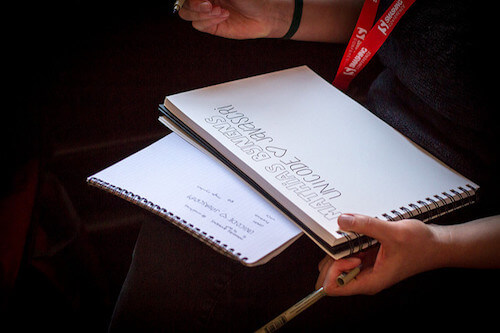How To Transform Your Next Conference Takeaways Into Real-Life Results
Have you ever been to a conference with top speakers, awesome people to network with and such a great energy that you got fired up and couldn’t wait to get home to start applying everything you’ve learned? How do things look two weeks later? Did you implement all of that learning into action? How about two months later? Were you still taking action on that knowledge?
If you got off track, don’t worry. That happens to most participants at any conference, no matter how great it is. In fact, the better the conference, the more likely you’ll be overwhelmed and won’t implement everything you wish to implement — unless you create a game plan to put the knowledge you acquire into action in a way that doesn’t overload you.
Here are a few tips on how you can do that in just a few minutes between sessions.
- Set an actionable goal,
- Write down the reason why you are implementing this new action,
- Be clear on how this new action will affect you,
- Be clear on how this new action will affect others,
- Take only essential notes,
- Set up a reward system,
- Get an accountability partner,
- Identify potential obstacles,
- Schedule time to take action daily or weekly,
- Implement one strategy or action at a time.
Set An Actionable Goal
It is easy to tell yourself, “I’ll implement this strategy in my organization as soon as I get back home,“ or “Two months from now, I’ll have mastered this skill.” The hardest part is ensuring that you actually implement the strategy or that you practice enough to master the skill.
To solve this problem, at the end of each presentation, commit yourself to applying the newly acquired knowledge for a certain period of time or for a certain number of times each day. Setting aside 30 minutes to focus on that subject every day is a lot more effective than completely transforming how you work in just a week, particularly if you have trouble acquiring habits.

Write Down The Reason Why You Are Implementing This New Action
Will this new action save you time in the future? Will it triple your productivity? Will it make you a better web designer? How so?
Write down your motivation right after the presentation is over, so that once you are back home and face the first setback, you can read again why you decided on it in the first place. This will help you to persevere until it works for you.
Be Clear On How This New Action Will Affect You
For every action there is a reaction. It would be naive to think that this new action won’t have any impact on you.
Maybe you will incur some extra costs. Maybe you will get frustrated until you master the new skill. Or maybe you will have to work a bit more in the beginning. When you become clear on those possible setbacks, you can create strategies to minimize or even eliminate them.
Also, be clear on the positive impact it will have on you. When things are in place and you start reaping the rewards of your actions, what will those rewards look like? Will you be making or saving more money? Will the quality of your work skyrocket? Once you know the rewards, you can create strategies to get the most out of them.
You don’t need to come up with those strategies at the conference. All you need is a quick brainstorm on the positive and negative impact of this new action. You can come up with the strategies later on, once the conference is over. For now, just have an idea of what might get in your way, so that you can prepare for it, and know what you might get out of it, so that you can leverage it.
Be Clear On How This New Action Will Affect Others
If you work on a team, your new action will directly or indirectly affect them, especially if you are the only one who attended the conference. Ideally, your whole team would go to the conference with you, but that is not always possible.
When you get back from a conference and start working harder, some of your team members might get jealous and try to undermine your efforts (even if subconsciously). You may have learned of a great idea at the conference that your colleagues don’t find so great because they don’t share the context in which you learned it; and, because of that, they might turn down your idea. That can be discouraging.
Once you’re clear on how your ideas or new work ethic might affect your colleagues, you can come up with ways to give them the context they need, so that they see the power of the idea before you present it to them.

If you feel comfortable presenting, you could even offer a mini-workshop for them based on what you’ve learned. That’s a double-win because, first, they will learn the key points and, secondly, by teaching them, you will assimilate about 90% of what you learned at the conference.
Once again, you don’t need to come up with strategies during breaks between sessions, but at least brainstorm on how this new action could impact those around you.
Take Only Essential Notes
Every conference has two types of audience members, the ones who are always with their head down taking notes and the others who don’t bother to write anything. Both types miss out on important aspects of live presentations. The person who is always writing very often gets so focused on the content that they end up missing the broader context. That leads to confusion and abstract content when they get around to reviewing their notes. The person who pays attention but doesn’t take notes might understand the context and learn a lot better, but because our brains can process only seven pieces of information at a time (give or take two), that person will have a hard time recalling everything they learned.

To solve this dilemma, develop the habit of taking notes quickly and effectively. Sketchnotes, mindmaps and flowcharts are great options. Familiarize yourself with them, and apply whichever you feel is most appropriate for the moment. For instance, sketchnotes could be your standard method of note-taking; when you want to take notes about a complex strategy, you could draw a mindmap; and when you are learning about a process that has multiple steps and a certain order to those steps, you could opt for a flowchart. As you become familiar with these note-taking options, you’ll notice what works best for you in each situation. For now, just pick one and start with it.
Set Up A Reward System
In most cases, when you start implementing what you’ve learned, you won’t get results right away. Most likely you will go through some frustration before succeeding. Encountering challenges in implementing a new strategy or concept is perfectly natural. It simply means you are learning something new, and as a result, it will help you to become a better at what you do.
According to the four-stage model of learning a new skill, created by Noel Burch and made famous by Abraham Maslow, when we learn any new skill we move first from unconscious incompetence (where we have no idea that we don’t know something) to conscious incompetence (where we are aware of our lack of skill). This is the time when most people might get frustrated and give up.
To get yourself excited about the initial challenges and avoid the initial discouragement, set up a reward system. This will remind you that you are on the right track.
You could simply give yourself a small prize to reward your commitment. If you have taken the action you have committed to take for the entire week, reward yourself with a massage, a few hours of playing that video game you love or going to your favorite restaurant. This will keep you going when frustration would normally set in.
By using rewards to keep you from giving up, you will carry yourself through the initial challenges of the conscious-incompetence phase, and soon you will reach conscious competence, when you can perform the new skill quite well but still need to think about it. The great news is that, once you are at the conscious-competence level and keep performing this new skill, very soon it will become automatic, and you won’t need to even think about it — you will just do. This is the fourth stage, of unconscious competence.
Rewards will facilitate this process because they will condition you to perform the action more often.
Setting up a reward system is quite simple. Think of one or more small rewards you can give yourself each time you take the action you’ve committed to take. For example, If you’ve committed to working with a particular skill set for an hour every work day, by the end of that hour, give yourself a 30-minute break or your favorite candy bar or a bottle of your favorite beer. The reward doesn’t have to be big, but it has to feel like an acknowledgement of your effort.

You might be thinking, “This reward stuff won’t work for me; I’d rather reward myself when I finish the project.” Well, consider the famous research of Ivan Pavlov on conditioning. If you reward yourself only when you complete a project, you will condition yourself to complete projects more quickly, and you will most likely grow willing to sacrifice the quality of your work for it. This process happens unconsciously. On the other hand, if you reward yourself for working hard, you will condition yourself to work hard and focus. By working hard and being focused, you will automatically get more work done in a shorter period of time, without sacrificing quality.
Pro tip: Think of many different rewards, write them down, and put the paper in a jar. Every time you earn a reward, pull a paper from the jar and give yourself that reward. This relies on the same psychological trick that subscription boxes and scratch cards use to hook you in, but this time you are the one in control, and you win every single time.
Get An Accountability Partner
During the conference, you will be among awesome people with objectives very similar to yours. You will also have plenty of opportunities to network with them. Why not take advantage of that?
When you meet a couple of fellow web designers with similar aspirations, and you are constantly in touch with them, even if only via Facebook, you can support each other to stay on track with your goals. You will also have a great source of learning because they will be implementing the same things as you.
Instead of asking the standard questions like, “Where are you from?” and “What do you do?,” ask questions that will reveal whether you could be good accountability partners for each other:
- “What topic have you liked most so far, and what are you most likely to put into practice right away?”
- “What inspired you to come to this conference?”
- “I really liked what the last speaker said. Have you tried doing that?”
Questions like these take the pressure off because, while they still count as small talk, they allow you to talk about many subjects without stalling the conversation. And you will be able to more easily spot who among the attendees would be a good accountability partner.
Identify Potential Obstacles
Perhaps a few pressing projects are awaiting your return. Or maybe some things will distract you in the coming weeks. Or perhaps you have a history of losing enthusiasm quickly.
Whatever it is, now is the time to become aware of those things. Devote a couple of minutes to thinking of what could prevent you from following through with your actions. After the event, you can devise ways to avoid those obstacles and to follow through on the actions until they get you the result you want.
Schedule Time To Take Action Daily Or Weekly
Let’s face it: You are a busy person and have a lot of things going on in your life right now. Chances are, when you get back to your daily life, your schedule will be full of activity. If you try to fit in the action “whenever you can,” you will either push it to the end of the day (causing you stress) or not do it at all.
Before you go home, schedule a specific time every day to take the action. Treat the time as if it were a meeting with someone else. Do not try to justify moving it around anytime something comes up. Move it only when something truly urgent comes up.

Implement One Strategy Or Action At A Time
You will learn a ton of great content at the conference, content that could help you a lot. Most people try to implement everything at once; after all, they don’t want to miss out on the potential benefits. What happens instead is that they end up getting overwhelmed and start slacking off. This is a waste of a great conference.
If you can successfully implement just one strategy or action in your daily life, then the conference will have been more than worth your investment of time and money. That being said, you can still try to implement everything you believe would be useful to you. All you need to do is to write a list of things to implement; as soon as you have successfully implemented one item on the list, and it is now a habit or requires little conscious effort on your part, move on to the next item.
Beware! There is a popular myth that developing a new habit takes 21 days. This myth is based on a misreading of Maxwell Maltz’ book Psycho-Cybernetics. The myth was debunked when researchers at the University College London found that developing a habit takes on average 66 days. You don’t have to take two months to move on to the next item in your list, though. The study just shows the average; according to the same study, some people developed habits in as little as 18 days, and others in as long as 254 days. What matters is not the time, but how much repetition and intensity you put into implementing the new skill.
Getting to the next item in the list might take a few days or a few months. Either way, you will eventually get through the list and have implemented everything you find valuable.
So, get excited to attend your next conference, because if you follow the steps in this article, you will have a concise and effective action plan, one that will bring you more results than all of the previous conferences you’ve attended combined!
Further Reading
- Upcoming Web Design Conferences
- Smashing Conferences and Workshops
- Web Design Conferences Are Booming: But What’s Next?
- Taking A Closer Look At Tech Conferences








